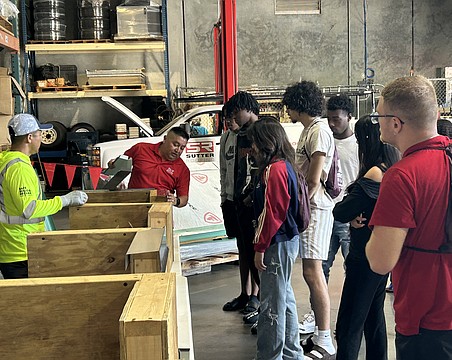Executive Summary
Company. Intertape Polymer Group Industry. Manufacturing, tape production Key. Company seeks to maintain steady growth amid industry challenges.
Lots of businesses talk about the importance of being “sticky,” whether that's by being memorable enough to affix in people's minds or being able to attract and retain customers.
For Intertape Polymer Group, the concept of stickiness applies both literally and figuratively.
The company, with dual headquarters in Sarasota and Montreal, develops, manufactures and sells a wide variety of products designed to help businesses and consumers with all kinds of sticky situations. Its paper- and film-based pressure-sensitive and water-activated tapes are used for everything from sealing cartons to repairing and protecting plumbing and air conditioning systems. It also offers shrink and stretch films, woven coated fabrics and other products to meet customers' packaging and sealing needs.
“We have probably the broadest product offering in the marketplace with the exception of 3M,” says Intertape CEO and President Greg Yull. “We pride ourselves on having deep-rooted relationships with our customers, and our products are as good or better than best in class.”
That's the literal stickiness. When it comes to the more figurative concept, the element of being a key industry player that customers feel bound to, Intertape has worked a lot over the past several years on increasing productivity and efficiency. The challenge there comes in weathering fluctuations in sales, revenues and raw material costs.
“The demands on companies like ours are greater than they ever have been,” says Yull. “You have to foster an environment within your company to ensure that you're under a continuous improvement umbrella. That's the price of staying in the business.”
An Intertape employee since 1989 and son of company founder Melbourne Yull, Greg Yull took over the CEO and president role in 2010. Since then, he's worked to boost revenues and cut costs in the midst of a recession and now still-recovering economy. “It's certainly been a fairly difficult time over the last five years as it relates to macro-economic growth,” he says.
How difficult? According to a July 2015 report from industry research firm IBISWorld, the U.S. adhesive tape industry saw annual decreases in revenues of 3% from 2010 to 2015. That was from increased foreign competition and decreased demand for products. The report expects revenues to increase at an annualized rate of 1% from 2015 to 2020, as profitability and consumer spending increase and demand for box-sealing and electrical tape grows.
Intertape itself has grown annual revenues 12.7% over the past five years, from $720.5 million in 2010 to $812.7 million in 2014. That growth comes partially from new product introductions. Between 2009 and 2012, the company introduced some 135 new products, and new products accounted for 18% of the company's sales at the end of the second quarter of 2015, up from 10% in 2011. “Our percent of new product sales as a total has increased significantly over the last five years,” says Yull.
Smart growth
Intertape is no stranger to doing what's necessary to grow and survive. The company was founded in 1981 in Montreal and began as a small regional tape producer.
“But the world and the competitive environment changed pretty dramatically in the '80s, and we had to go through a series of growth spurts to get bigger,” says Yull. “We went through a significant acquisition strategy in the '90s and then spent the last 10 years consolidating those acquisitions.”
Today the company employs some 1,950 people with 11 manufacturing facilities in North America and one in Europe. About 50 employees work out of the Montreal headquarters, while most of the management team and department heads are based in Sarasota, in an office complex off Fruitville Road, west of Interstate 75.
Intertape moved its executive headquarters from Bradenton to Sarasota in 2013 after outgrowing its previous space. “We worked together with them to make sure they found the right place to thrive and grow, and boy, they've done that,” says Mark Huey, president and CEO of the Economic Development Corporation of Sarasota County. “They are a crown jewel of economic development, and we consider them very significant customers for us.”
Much of the company's revenues come from the United States, which accounts for 80% of its sales. Another 10% comes from Canada and Mexico, and the rest is from overseas.
Intertape wouldn't mind increasing its non-U.S. sales. “We're intrigued with places outside of the U.S., so if the right acquisition comes along, we will take a look at it,” says Yull. But a startup project outside of the U.S. isn't likely, he adds.
Consolidation helps
Mergers and acquisitions are a major part of the company's growth plan. Earlier this year, it acquired Connecticut-based Better Packages, a leading supplier of water-activated tape dispensers. That allows the company to sell tapes and dispensers together to its customers, especially those in e-commerce, a major component of Intertape's business.
For future acquisitions, Intertape is on the lookout for singular location businesses with annual revenues between $20 million and $50 million and a strong management team willing to stay in place. “What [those kind of acquisitions] gives us is an opportunity to grow at a faster rate and hopefully open up markets that we're currently not in,” says Yull. “This industry is still fairly fragmented, and we believe that there is room for consolidation.”
Consolidation has also helped Intertape weather the recent economic storm. In 2011 it closed a facility in Brantford, Ontario, which had become unprofitable due to a prolonged strike by union employees. It discontinued most of the activities there and transferred some to other Intertape facilities.
Raw materials, such as polyethylene and polypropylene, represent another area where Intertape watches costs closely. “For us, it's all about the cost of raw materials for us to be competitive,” says Yull. “So we have to ensure that we buy our raw materials at a world competitive basis, and we spend a lot of time on that.”
Seeing the potential
Intertape's customers come from a wide swath of businesses. Food and beverage, e-commerce and transportation industries are major focus areas, with companies such as Tervis, Coach, Walmart and Boeing among the firm's client list.
The company has between a 20% and 30% market share for most of its tape products, and is the second-largest tape producer in North America behind 3M. Many of its products have a number-one or number-two market position. The continued growth and penetration of e-commerce has also changed things dramatically, says Yull, with sales of the company's case-closure and carton-sealing tape business strong.
Also, to increase its flexibility, Intertape recently entered into a new five-year, $300-million revolving credit facility with Wells Fargo and Bank of America. It replaces the company's former $200-million asset-based loan.
“More so than ever, quality, service and competitive pricing are must-haves,” says Yull. “And that becomes more and more prevalent as purchasing departments become more savvy.”
Hard choices
One way Intertape Polymer Group survived the recession is through consolidation.
An $812.7 million tape-manufacturing firm, Intertape closed one facility in 2011 in Canada when a prolonged strike by union employees made it unprofitable. Plant consolidations, along with productivity gains and labor and energy savings, saved Intertape $17 million in 2012, $14 million in 2013 and $14 million in 2014. The company anticipates reductions of between $9 million and $12 million in 2015. Cost-savings moves include:
In 2012 it closed a Richmond, Ky., facility that manufactured tape products, transferring production to an Illinois plant.
In 2012 it also transferred shrink-film production from its Truro, Nova Scotia facility to its Tremonton, Utah, site.
Intertape is also about halfway done with a major project in South Carolina that's expected to reduce costs annually by $13 million once it's completed. The $55 million investment involves relocating an old, energy-inefficient plant in Columbia, S.C., to a new, state-of-the-art facility in the same area that will provide gains in productivity and save energy costs. “It's a double whammy — huge savings and a much cleaner environmental footprint,” says Intertape CEO and President Greg Yull.
At a glance
Intertape Polymer Group
Symbol: ITP (Toronto Stock Exchange)
Headquarters: Sarasota and Montreal
CEO: Greg Yull
Year founded: 1981
Employees: 1,950
Manufacturing plants: 11 in North America, one in Europe
Revenues: $812.7 million in 2014
Market capitalization: $870.5 million
Source: Google finance






